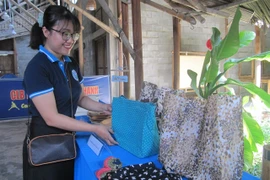Hanoi (VNA) - The use of plastic bags and products in traditional marketsand shops in the capital city of Hanoi has been on the rise again.
PhamHuy, a small trader at a traditional market in Long Bien district, said plasticbags and products were selling in large quantities in local markets becausethey were not only cheap but also convenient.
Itcosts 30,000 (1.3 USD) per roll of 100 plastics bags and 20,000 VND (0.8 USD)for 50 plastic cups, he said.
Huysaid the number of people shopping at the market was very large and most ofthem asked for plastic bags. Few people carried their own bags to the market.
“Ifwe do not use plastic bags, we have nothing to store things for our customers,”he said.
Anowner of a food shop in Quan Thanh street, Ba Dinh district, said hiscustomers often asked for takeaway food in plastic containers.
Althoughhe knew the impacts of plastic bags and products on the environment, he stillbought them to store food for his customers, he said.
HongHa, a resident of Ba Dinh district, said due to the impacts of the COVID-19pandemic, food and beverage outlets had to close and only sell online.
Peopleoften ordered using popular applications such as Grab and Now to eat and drinkat home, she said.
Theshops often used plastics bags and products to wrap up their wares for shippersto bring to customers, she said.
In2019, the city issued Plan No 232/KH-UBND on 'Preventing plastic waste and bagsby 2020, a vision towards 2025', calling on local administrative and publicservice agencies and State-owned enterprises not to use disposable plasticproducts and plastic bags, as well as mobilising organisations andindividuals to say no to disposable plastic products.
The municipal Department of Natural Resources and Environment has urged relevant agencies to strengthen dissemination toimprove people’s awareness of the impacts of plastic waste on theenvironment. The agencies were told to find alternative materials to reduce theuse of plastic products.
The department would conduct surveys on the use of disposable plasticproducts and the demand for recycled products to find alternative products toreplace disposable plastic in local traditional markets and trade centres.
Thedepartment also compiled mechanisms to support enterprises to manufactureenvironmentally-friendly packaging.
Itwas strengthening inspections and encouraging enterprises to manufactureenvironmentally-friendly packaging and pilot training programmes to improvecapacity to design environmentally-friendly products for commercial, serviceand manufacturing facilities in the city.
In addition, Hanoi is also working on the formation and operation of a supermarket coalition to minimise plastic shopping bags, thus cutting plastic waste and protecting the environment.
The effort is part of an initiative conducted with support from the EU and the German Government.
According to Fanny Quertamp from Expertise France, the project is a chance for Vietnam to take specific action to cut plastic waste, and she expressed her hope that the project will receive the active engagement of supermarkets around the country.
According to a representative from Lotte Mart Ba Dinh, foreign customers strongly support the scheme and are willing to pay for environmentally-friendly shopping bags. Many Vietnamese customers, however, are not happy, so stronger communication campaigns are needed to raise public awareness.
A BigC representative said the scheme should be introduced at all supermarkets to ensure fairness and proposed legal regulations on reductions to plastic waste and single-use plastic bags.
In order to minimise the use of such bags, the Hanoi Department of Industry and Trade held a working session with the Institute of Strategy and Policy on Natural Resources and Environment at the Ministry of Natural Resources and Environment.
According to the department, 140 out of 170 supermarkets and trade centres in Hanoi have switched from plastic shopping bags to bio-degradable bags and multi-use shopping bags.
The majority of facilities use food packaging materials made of bagasse and natural materials.
Meanwhile, many retail and distribution businesses have offered promotions to customers who use their own shopping bags.
Environmental experts, however, said the habit of using plastic bags continues among a large number of shoppers, especially at traditional markets.
According to the United Nations Environment Programme (UNEP), around the world, 1 million plastic drinking bottles are purchased every minute, while 5 trillion single-use plastic bags are used worldwide annually. In total, half of all plastic produced is designed to be used only once and then thrown away./.






























